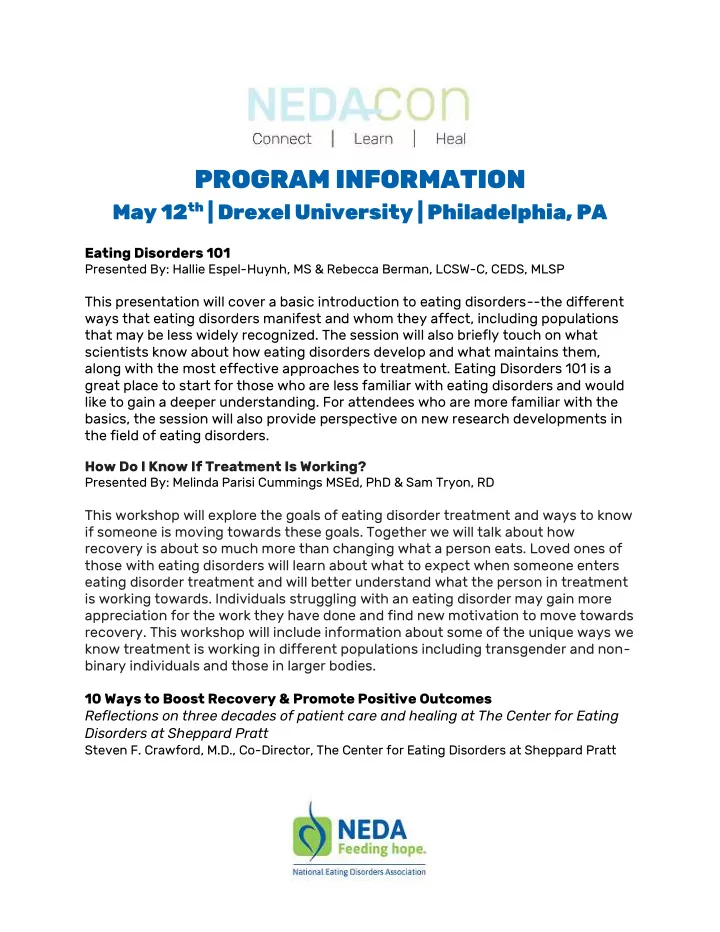

PROGRAM INFORMATION May 12 th | Drexel University | Philadelphia, PA Eating Disorders 101 Presented By: Hallie Espel-Huynh, MS & Rebecca Berman, LCSW-C, CEDS, MLSP This presentation will cover a basic introduction to eating disorders--the different ways that eating disorders manifest and whom they affect, including populations that may be less widely recognized. The session will also briefly touch on what scientists know about how eating disorders develop and what maintains them, along with the most effective approaches to treatment. Eating Disorders 101 is a great place to start for those who are less familiar with eating disorders and would like to gain a deeper understanding. For attendees who are more familiar with the basics, the session will also provide perspective on new research developments in the field of eating disorders. How Do I Know If Treatment Is Working? Presented By: Melinda Parisi Cummings MSEd, PhD & Sam Tryon, RD This workshop will explore the goals of eating disorder treatment and ways to know if someone is moving towards these goals. Together we will talk about how recovery is about so much more than changing what a person eats. Loved ones of those with eating disorders will learn about what to expect when someone enters eating disorder treatment and will better understand what the person in treatment is working towards. Individuals struggling with an eating disorder may gain more appreciation for the work they have done and find new motivation to move towards recovery. This workshop will include information about some of the unique ways we know treatment is working in different populations including transgender and non- binary individuals and those in larger bodies. 10 Ways to Boost Recovery & Promote Positive Outcomes Reflections on three decades of patient care and healing at The Center for Eating Disorders at Sheppard Pratt Steven F. Crawford, M.D., Co-Director, The Center for Eating Disorders at Sheppard Pratt
In this presentation, Dr. Steven Crawford will draw from the research and his own clinical observations in the field to highlight ten important considerations for making the most of the eating disorder recovery process. This presentation addresses the reality of treatment and recovery as a significant challenge but one that is achievable. Definitions of recovery will be discussed and evidence-based opportunities to strengthen or enhance recovery will be presented. Dr. Crawford will address ten overarching guidelines that include 1) specific actionable steps 2) overarching principles and 3) areas of special attention that can make a difference for individuals at any stage of the recovery process. Participants will leave with tangible ideas for change, options for challenging stuck thinking and inspiration for strengthening their own recovery or that of a loved one. Forgotten Bodies On the importance of Intersectionality for the Evolution of Eating Disorder Recovery and Treatment Presented By: Colleen Reichmann, PhD, & Ivy Felicia In this presentation, we will be discussing the concept of Health at Every Size as it applies to eating disorder recovery. The concept of internalized and systemic fat- phobia will be defined. We will also explain the importance of the body positive movement. Participants will have the chance to learn how internalized weight stigma plays a role in the development and maintenance of eating disorders. The ideas presented will be helpful to patients, family members, and professionals alike, as psychoeducation about fat-phobia roots and consequences is typically left out of traditional approaches to eating disorder recovery. Media Literacy Presented By: Samantha DeCaro, PsyD We are bombarded with images and messages from the media every day, and are constantly absorbing information about how we should think and feel about our bodies and our food. This presentation will provide the mental tools required to navigate media manipulation and become a critical consumer. Learn how emotions and basic needs are leveraged to influence your choices as a consumer, and discover powerful ways we can push back against the companies that perpetuate toxic ideals and advocate for change. Join us for an experiential exercise where we use the tools we’ve learned to deconstruct and reframe real life examples found in the media. Self-care Tools for Sustaining Recovery Presented By: Laura Cipullo
Self- care tools are the foundation of one’s journey in recovery. Whether you are in recovery or supporting a loved one in recovery from an eating disorder, use this as your opportunity to identify the tools for balancing the four buckets of self-care: Nutrition, Sleep, Movement, and Stress Management. Learn supportive language and participate in a mindfulness exercise, allowing for an immediate sense of relief. Recovery Panel: Self Care, Expectations & Maintenance Moderated By: Jennifer Kreatsoulas, PhD, RYT This panel will be an opportunity for individuals to share their different experiences related to personal self-care as it relates to their experiences with eating disorders and what ways they have found to maintain their recovery, support loved ones, and exert self-care during the years following treatment. More information to follow. Challenges in Recovery, A Panel Discussion Moderated By: Brian Pollack, LCSW, CEDS This panel will discuss ways individual physical challenges have conflicted with the traditional ideas of recovery culture and how the panelists have worked through these issues. More information to follow.
Recommend
More recommend